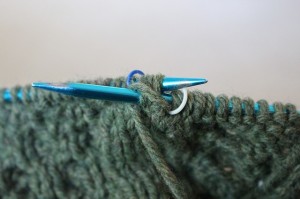Stitch in time
I don’t often write “follow-up” columns, mostly because life moves quickly, and I can barely remember what I wrote about last week, much less several months or years ago. But I’m making an exception today because I’ve learned something new that feels worthy of an update.
In addition to my current job titles as wife, mother, daughter, writer, driver of kids, cleaner-upper, grilled cheese maker, pet feeder, grocery shopper, appointment scheduler and gift wrapper, I’m now proud to report that I am also a knitter. About six months ago, I wrote a column about how I couldn’t quite shake this urge to learn how to knit, despite a busy schedule that insisted I had a million other things to do besides sit around with a ball of yarn. But then I stumbled across an article published by CBS News that convinced me that knitting would be good for my brain.
The article is titled “How Busy Hands Can Alter Our Brain Chemistry,” and it features an interview with Kelly Lambert, a neuroscientist at the University of Richmond. She says that repetitive movement increases certain neurochemicals in the brain. If that movement produces something, the brain gets the rewarding satisfaction of that new creation.
Perhaps busy hands are important now more than ever, since today’s workers spend so much time staring into screens. “We just sit there. And we press buttons,” Lambert said. “And you start to lose a sense of control over your environment.”
I, like so many others, am a pusher of buttons – on my computer, my phone, the car, even the household appliances. And it’s amazing how, at the end of the day, I often feel like I’ve worked hard with not much to show for it.
So, I went shopping for knitting needles and spent way too much time touching yarn at the craft store. Then I found some tutorial videos on YouTube that taught me how to make those first few unsteady stitches. After that, I was hooked.
As a newbie knitter, I’m still slow and confused much of the time. My first project was a scarf full of mistakes and uneven stitches. But when I got it to the desired length, I held it up proudly and showed it to Tom, who seemed genuinely surprised that the pile of yarn had turned into something somewhat recognizable.
“Well, what do you think?” I asked.
“It’s great!” he said, nodding approvingly. (That might have been his honest opinion, but it also could have been something a cautious husband says to a wife who’s holding sharp knitting needles while fishing for compliments.)
The second project, also a scarf, turned out better than the first, and it gave me enough confidence to learn a few new stitches. Even more than that, I’m realizing that this knitting thing is a perfect metaphor for life itself.
It’s full of slow beginnings. And for the first few rows of any project, it doesn’t look like much of anything. It takes a while for the project to make sense and take shape. Even after it does begin to take shape, it’s not a “quick fix.” At the beginning of that first scarf, it felt like I’d never get done. And there were many times I’d “drop a stich” and have to rip out a mistake to fix it. But stitch by stich, row by row, the project started to build on itself.
Knitting has given me a whole new appreciation for the process of slow but steady accumulation. On any given night, it doesn’t feel like I’m making much progress. But over time, even with only a few rows a night, the scarf length grows. I can hold it in my hands and see that I’m getting somewhere. In a world obsessed with immediate gratification, it’s comforting to know that slow and steady still count for something.
This two-handed activity has also forced me to put down my phone and stop scrolling headlines or social media at night. It’s a break from all that button-pushing. I can have conversations and watch tv while I’m knitting, and it’s a wonderful excuse for getting out of doing things I don’t want to do. (“Hey, can you go change that load of laundry for me? I can’t put this knitting down right now because I’m in the middle of a row.”)
From one button-pusher to another, I hope you, too, have a two-handed activity that makes your brain happy in this fast-paced world full of buttons and screens. Whether it’s knitting, cooking, drawing, painting, building, or even something simple like folding clothes, ironing, washing dishes, or coloring, I don’t think the thing you make is nearly as important as the process of making it. Busy hands equal a happier brain.
 Gwen Rockwood is a mom to three great kids, wife to one cool guy, a newspaper columnist and co-owner of nwaMotherlode.com. You can read more of Gwen’s work by clicking here to visit The Rockwood Files.
Gwen Rockwood is a mom to three great kids, wife to one cool guy, a newspaper columnist and co-owner of nwaMotherlode.com. You can read more of Gwen’s work by clicking here to visit The Rockwood Files.
